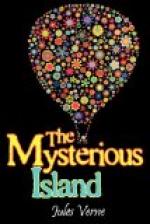There was, however, nothing to show that a shipwreck had taken place recently. It is true that, as Gideon Spilett observed, any remains of it might have drifted out to sea, and they must not take it for granted that because they could find no traces of it, a ship had not been castaway on the coast.
The reporter’s argument was just, and besides, the incident of the bullet proved that a shot must have been fired in Lincoln Island within three months.
It was already five o’clock, and there were still two miles between the settlers and the extremity of the Serpentine Peninsula. It was evident that after having reached Reptile End, Harding and his companions would not have time to return before dark to their encampment near the source of the Mercy. It would therefore be necessary to pass the night on the promontory. But they had no lack of provisions, which was lucky, for there were no animals on the shore, though birds, on the contrary, abound—jacamars, couroucous, tragopans, grouse, lories, parrots, cockatoos, pheasants, pigeons, and a hundred others. There was not a tree without a nest, and not a nest which was not full of flapping wings.
Towards seven o’clock the weary explorers arrived at Reptile End. Here the seaside forest ended, and the shore resumed the customary appearance of a coast, with rocks, reefs, and sands. It was possible that something might be found here, but darkness came on, and the further exploration had to be put off to the next day.
Pencroft and Herbert hastened on to find a suitable place for their camp. Among the last trees of the forest of the Far West, the boy found several thick clumps of bamboos.
“Good,” said he; “this is a valuable discovery.”
“Valuable?” returned Pencroft.
“Certainly,” replied Herbert. “I may say, Pencroft, that the bark of the bamboo, cut into flexible laths, is used for making baskets; that this bark, mashed into a paste, is used for the manufacture of Chinese paper; that the stalks furnish, according to their size, canes and pipes and are used for conducting water; that large bamboos make excellent material for building, being light and strong, and being never attacked by insects. I will add that by sawing the bamboo in two at the joint, keeping for the bottom the part of the transverse film which forms the joint, useful cups are obtained, which are much in use among the Chinese. No! you don’t care for that. But—”
“But what?”
“But I can tell you, if you are ignorant of it, that in India these bamboos are eaten like asparagus.”
“Asparagus thirty feet high!” exclaimed the sailor. “And are they good?”
“Excellent,” replied Herbert. “Only it is not the stems of thirty feet high which are eaten, but the young shoots.”
“Perfect, my boy, perfect!” replied Pencroft.
“I will also add that the pith of the young stalks, preserved in vinegar, makes a good pickle.”




